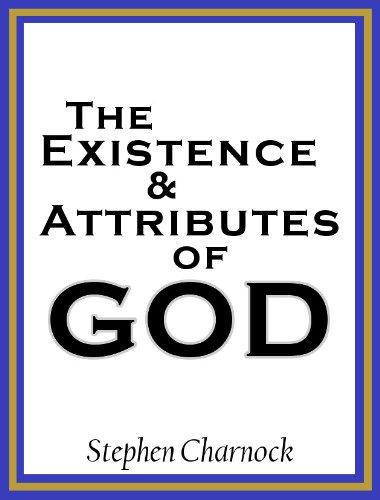
Quotes by Stephen Charnock
He was more delighted with His sufferings for us than we can be with the greatest worldly pleasures and grandeur, and valued reproaches for us above the empire of the world.
To accept so willingly of such hard conditions for us, and die so ignominiously upon the cross we had deserved! He knew the burden of sin, He knew the terrors of hell, yet He did not shrink from the imputation of the one, or the sufferings of the other; it was not a willingness founded upon ignorance, but upon a clear-sighted affection. He was willing to be reproached, that we might be glorified; He would be like to us, that we might be conformed to Him; and took our human nature, that we might in a sort partake of His divine.
O wonderful love! To open His breast to receive into His own heart the sharp edge of that sword which was directed against us.
How willingly then should we part with our sins for Christ, and do our duty to Him! O that we could in our measures part as willingly with our lusts, as He did with His blood! He parted with His blood when He needed not, and shall not we with our sins, when we ought to do so, for our own safety, as well as for His glory. Since Christ came to redeem us from the slavery of the devil, and strike off the chains of captivity, He that will remain in them, when Christ with so much pains and affection hath shed His blood to unloose them, prefers the devil and sin before a Savior.
Since there was no omission of anything required of Him, no commission of anything forbidden to Him. The whole law, both the mediatorial law, and the law of nature, were within His heart; the whole law was answered by His life.
This Sweet Savior exhaled from His voluntariness; He was not dragged to His sufferings, but suffered more willingly than we had greedily sinned against God. We had conscience checking us in sinning, but Christ had no conscience checking Him in suffering; it was his meat and drink to do His Father’s will. As God’s order makes His sacrifice capable of being satisfactory, so the free willingness of Christ makes it capable of being accepted for us, and applied to us.
If the honor of the law could have been vindicated, and the justice of God satisfied, by the temporary groans of a creature, not only the goodness of God, but the justice of God would release him; but because the justice of God could never have been satisfied, the person of the sinner must always have been a sufferer. Christ therefore suffering a cursed death, suffered what we should have suffered; death was threatened to us, and death was inflicted on Him.
It was love that [God] would restore man after the fall; there was no more necessity of doing this than of creating the world, as it added nothing to the happiness of God, so the want of it had detracted nothing from it.
As a merciful God, He pitied us; but as a holy God, He could not but hate our transgression; as a God of truth, He could not but fulfill His own threatening; as a God of justice, He must avenge Himself for the offense against Him. He gave Christ as a God of mercy, and required satisfaction as a God of justice.
The agonies of Christ were more than the sufferings of all the martyrs, and all men in the world, since God laid upon him the sins of the whole world.
Jesus then puts Himself into our place, to free us from the arrest of justice, and bear those strokes, which, by virtue of the law, wrath had prepared for us…It was a death which justice required, and at the sight of it justice was so calmed, that the sharp revenging sword drops out of its hand.
An infinite sin deserves an infinite punishment because it receives its aggravation from the dignity of the person against whom it is committed. So the sufferings of Christ, though finite in regard of His human nature, received an infinite value from the infiniteness of His person, equivalent to the debts of all that come to Him. Sin is finite in regard to this subject, infinite in regard to the great God against whom it is. The sufferings of Christ are infinite in regard of the subject and infinitely please the Governor of the world unto whom the offering is made.
Believers are personally guilty, but by virtue of the satisfaction of this sacrifice imputed to them, they are judiciously counted innocent. Christ, who never sinned, is put in a state as if He had; and we, who have always sinned, are put into a state by Him as if we never had. As we are made righteous in Him, so He was made sin for us.
Our unrighteousness put us under a necessity of a sacrifice, and His righteousness made Him fit to be one.
The soldiers that spat upon Him, and mocked Him, met not with a reproachful expression from Him. He held His peace at their clamors, offered His back to their scourges, reviled them not when He lay under the greatest violence of their rage, was patient under His sufferings, while He was despised more than any man by the people. His calmness was more stupendous than their rage, and the angels could not but more inexpressibly wonder at the patience of the sufferer, than the unmercifulness of the executioners; He was more willing to die, than they were to put Him to death; He suffered not by force, He courted the effusion of His blood, when He knew that the hour which His Father had appointed, and man needed, was approaching. Neither the infamy of the cross, nor the sharpness of the punishment, nor the present and foreseen ingratitude of his enemies, could deter Him from desiring and effecting man’s salvation. He went to it, not only as a duty, but an honor; and was content for a while to be the sport of devils, that He might be the spring of salvation to men.
How much more stupendous in submitting to such a death, as shameful as His life was miserable! For the Son of God to be counted the vilest of men; the Sovereign of angels, to be made lower than His creatures; the Lord of heaven, to become a worm of the earth; for a Creator to be spurned by His creatures – is an evidence of a meekness not to be paralleled.
A lamb is a meek creature. It hurts none, is hurt by all; it hangs not back, when it is led to the slaughter; it cries not when it is pierced; no greater emblem of patience to be found among irrational creatures. To this the prophet likens our Savior, when he said, “He was brought as a lamb to the slaughter, and as a sheep before the shearers is dumb, so he opened not his mouth,” Isaiah 53:7. How strange was His humility in entering into such a life!
A strong meditation on Christ will excite compassion for His sufferings, but a detestation of our sins and selves as the cause of them. It is a look upon Christ pierced, that pierces the soul, Zechariah 12:10.
Our crimes merited our sufferings, but His own mercy made Him a sufferer for us; for us He sweat those drops of blood, for us He trod the winepress alone, for us He assuaged the rigor of divine justice, for us, who were not only miserable, but offending creatures, and overwhelmed with more sins to be hated, than with misery to be pitied. He was crucified for us by His love, who deserved to die by His power, and laid the highest obligation upon us, who had laid the highest offenses upon Him.
We lost a paradise by sin, and have gained a heaven by the cross.
The empire the devil exercised over man, did not arise from any dignity in his person, or any right he had to him in himself, but it was first founded on sin, and granted to him by the justice of God, and was not the power of a prince, but of an executioner. Had not sin first opened the door, his venom could not have infected us, nor his power have hurt us. He could never have been our accuser without some matter of charge from us: nor ever have been our executioner, had we not fallen under the hands of divine justice. His power is erected upon our crimes, whereby he becomes the minister of divine vengeance.
[Jesus] was ordained to be put into the state and condition of a sinner in our stead; not into the practical and experimental state of sin, but the penal state of a sinner, to be a sacrifice for it, not to be polluted with it.
Presume not upon God’s patience. The exercise of it is not eternal; you are at present under His patience, yet while you are unconverted you are also under His anger: “God is angry with the wicked every day” (Psm. 7:11). You know not how soon His anger may turn His patience aside, and step before it. It may be His sword is drawn out of the scabbard, His arrows may be settled in His bow, and perhaps there is but a little time before you may feel the edge of the one or the point of the other, and then there will be no more time for patience in God to us, or petition from us to Him. If we die without repentance, He will have no longer mercy to pardon, nor patience to bear.
Grace is as large in renewing us as sin was in defacing.
Nourish right conceptions of the majesty of God in your minds. Let us consider that we are drawing to God, the most amiable object, the best of beings, worthy of infinite honor, and highly meriting the highest affections we can give; a God that made the world by a word, that upholds the great frame of heaven and earth; a Majesty above the conceptions of angels; who uses not His power to strike us our deserved punishment, but His love and bounty to allure us; a God that gave all creatures to serve us, and can, in a trice, make them as much our enemies as he hath now made them our servants. Let us view Him in His greatness, and in His goodness, that our hearts may have a true value of the worship of so great a majesty, and count it the most worthy employment with all diligence to attend upon Him.
Not all the vials of judgment that have or shall be poured out upon the wicked world, nor the flaming furnace of a sinner’s conscience, nor the irreversible sentence pronounced against the rebellious demons, nor the groans of the damned creatures – give such a demonstration of God’s hatred of sin – as the wrath of God let loose upon His Son! Never did divine holiness appear more beautiful and lovely than at the time our Savior’s countenance was most marred in the midst of His dying groans – when God had turned His smiling face from Him, and thrust His sharp knife into His heart, which forced that terrible cry from Him, “My God, My God, why have You forsaken Me!”
A proud faith is as much a contradiction as a humble devil.
A Puritan Golden Treasury, compiled by I.D.E. Thomas, by permission of Banner of Truth, Carlisle, PA. 2000, p. 223.
Without faith we are not fit to desire mercy, without humility we are not fit to receive it, without affection we are not fit to value it, without sincerity we are not fit to improve it.
A Puritan Golden Treasury, compiled by I.D.E. Thomas, by permission of Banner of Truth, Carlisle, PA. 2000, p. 189.
Without the heart it is not worship; it is a stage play; an acting a part without being that person really…a hypocrite. We may truly be said to worship God-though we lack perfection; but we cannot be said to worship Him if we lack sincerity.
It is a sad thing to be Christians at a supper, heathens in our shops, and devils in our closets.
A Puritan Golden Treasury, compiled by I.D.E. Thomas, by permission of Banner of Truth, Carlisle, PA. 2000, p. 152.
If every attribute of the Deity were a distinct member, holiness would be the soul to animate them. Without holiness His patience would be an indulgence to sin, His mercy a fondness, His wrath a madness, His power a tyranny, His wisdom an unworthy subtlety.Holiness gives decorum to them all.
As it seems to challenge an excellency above all His other perfections, so it is the glory of all the rest; as it is the glory of the Godhead, so it is the glory of every perfection in the Godhead; as His power is the strength of them, so His holiness is the beauty of them; as all would be weak without almightiness to back them, so all would be uncomely without holiness to adorn them. Should this be sullied, all the rest would lose their honour; as at the same instant the sun should lose its light, it would lose its heat, its strength, its generative and quickening virtue. As sincerity is the luster of every grace in a Christian, so is purity the splendor of every attribute in the Godhead. His justice is a holy justice, His wisdom a holy wisdom, His arm of power a "holy arm" (Ps. 98:1), His truth or promise a "holy promise" (Ps. 105:42). His name, which signifies all His attributes in conjunction, "is holy," Psalm 103:1.
It is less injury to Him to deny His being, than to deny the purity of it; the one makes Him no God, the other a deformed, unlovely, and a detestable God… He that saith God is not holy speaks much worse that he that saith there is no God at all.
All our works before repentance are dead works (Hebrews 6:1). And these works have no true beauty in them, with whatsoever gloss they may appear to a natural eye. A dead body may have something of the features and beauty of a living, but it is but the beauty of a carcass, not of a man… Since man, therefore, is spiritually dead, he cannot perform a living service. As a natural death does incapacitate for natural actions, so a spiritual death must incapacitate for spiritual actions.
A Puritan Golden Treasury, compiled by I.D.E. Thomas, by permission of Banner of Truth, Carlisle, PA. 2000, p. 126.
Wisdom and power are the ground of the respect we give to men; they being both infinite in God, are the foundation of a solemn honor to be returned to Him by His creatures. If a man make a curious engine, we honor him for his skill; if another vanquish a vigorous enemy, we admire him for his strength; and shall not the efficacy of God’s power in creation, government, redemption, inflame us with a sense of the honor of His name and perfections! We admire those princes that have vast empires, numerous armies, that have a power to conquer their enemies, and preserve their own people in peace; how much more ground have we to pay a mighty reverence to God, who, without trouble and weariness, made and manages this vast empire of the world by a word and beck! What sensible thoughts have we of the noise of thunder, the power of the sun, the storms of the sea! These things, that have no understanding, have struck men with such a reverence that many have adored them as gods. What reverence and adoration does this mighty power, joined with an infinite wisdom in God, demand at our hands.
As holiness is the beauty of all God’s attributes, so power is that which gives life and action to all the perfections of the Divine nature. How vain would be the eternal counsels, if power did not step in to execute them. Without power His mercy would be but feeble pity, His promises an empty sound, His threatenings a mere scarecrow. God’s power is like Himself: infinite, eternal, incomprehensible; it can neither be checked, restrained, nor frustrated by the creature.
How foolish is every sinner. Can we poor worms strut it out against infinite power? Oh, that every obstinate sinner would think of this, and consider his unmeasurable boldness in thinking himself able to grapple with omnipotence! What force can any have to resist the presence of Him before whom rocks melt, and the heavens at length shall be shriveled up as a parchment by the last fire! As the light of God’s face is too dazzling to be beheld by us, so the arm of His power is too mighty to be opposed by us.
Had it been published by a voice from heaven, that twelve poor men, taken out of boats and creeks, without any help of learning, should conquer the world to the cross, it might have been thought an illusion against all reason of men; yet we know it was undertaken and accomplished by them.
God doth not will [sin] directly, and by an efficacious will. He doth not directly will it, because He hath prohibited it by His law, which is a discovery of His will; so that if He should directly will sin, and directly prohibit it, He would will good and evil in the same manner, and there would be contradictions in God’s will: to will sin absolutely, is to work it (Psalm 115:3): “God hath done whatsoever He pleased.” God cannot absolutely will it, because He cannot work it. God wills good by a positive decree, because He hath decreed to effect it. He wills evil by a private decree, because He hath decreed not to give that grace which would certainly prevent it. God doth not will sin simply, for that were to approve it, but He wills it, in order to that good His wisdom will bring forth from it. He wills not sin for itself, but for the event.
God, apart from Christ, is an angry, offended Sovereign. Unless we behold Him in and through Christ, the Mediator, the terrors of His Majesty would overwhelm us. We dare not approach the Father except in Christ because of our sins. We first fasten our eyes upon Christ, then upon the Father. If Christ does not bear our guilt and reconcile us unto God, we perish! Before any man can think to stand before the face of God’s justice or be admitted to the secret chamber of God’s mercy or partake of the riches of His grace, he must look to the Mediator, Christ Jesus.
When we enjoy God, we enjoy Him in His eternity without any flux… After many ages, the joys will be as savory and satisfying as if they had been but that moment first tasted by our hungry appetites. When the glory of the Lord shall rise upon you, it shall be so far from ever setting, that after millions of years are expired, as numerous as the sands on the seashore, the sun, in the light of whose countenance you shall live, shall be as bright as at the first appearance; He will be so far from ceasing to flow, that He will flow as strong, as full, as at the first communication of Himself in glory to the creature. God is always vigorous and flourishing; a pure act of life, sparkling new and fresh rays of life and light to the creature, flourishing with a perpetual spring, and contenting the most capacious desire; forming your interest, pleasure, and satisfaction; with an infinite variety, without any change or succession; He will have variety to increase delights, and eternity to perpetuate them; this will be the fruit of the enjoyment of an infinite and eternal God.
When we enjoy God, we enjoy Him in His eternity without any flux… Time is fluid, but eternity is stable; and after many ages, the joys will be as savory and satisfying as if they had been but that moment first tasted by our hungry appetites. When the glory of the Lord shall rise upon you, it shall be so far from ever setting, that after millions of years are expired, as numerous as the sands on the seashore, the sun, in the light of whose countenance you shall live, shall be as bright as at the first appearance; He will be so far from ceasing to flow, that He will flow as strong, as full, as at the first communication of Himself in glory to the creature. God is always vigorous and flourishing; a pure act of life, sparkling new and fresh rays of life and light to the creature, flourishing with a perpetual spring, and contenting the most capacious desire; forming your interest, pleasure, and satisfaction; with an infinite variety, without any change or succession; He will have variety to increase delights, and eternity to perpetuate them; this will be the fruit of the enjoyment of an infinite and eternal God.
Works make not the heart good, but a good heart makes the works good.
A Puritan Golden Treasury, compiled by I.D.E. Thomas, by permission of Banner of Truth, Carlisle, PA. 2000, p. 197.
Assurance is the fruit that grows out of the root of faith.
A Puritan Golden Treasury, compiled by I.D.E. Thomas, by permission of Banner of Truth, Carlisle, PA. 2000, p. 21.
In regard of God, patience is a submission to His sovereignty. To endure a trial, simply because we cannot avoid or resist it, is not Christian patience. But to humbly submit because it is the will of God to inflict the trial, to be silent because the sovereignty of God orders it – is true godly patience.
When we believe that we ought to be satisfied, rather than God glorified, we set God below ourselves, imagine that He should submit His own honor to our advantage; we make ourselves more glorious than God, as though we were not made for Him, but He made for us; this is to have a very low esteem of the majesty of God.
To pretend a homage to God, and intend only the advantage of self, is rather to mock Him than worship Him. When we believe that we ought to be satisfied [in selfish pursuits], rather than God glorified, we set God below ourselves. [When we] imagine that He should submit His own honor to our advantage we make ourselves more glorious than God.
If God is in fact our Enemy with only destructive intentions toward us, why do we experience any good at all? It isn’t surprising that life is painful. What’s surprising is that life is joyful. What do our simple, daily joys mean? Is God pretending to be our Friend, is He setting us up for the ultimate nasty surprise? Or is God sending us signals every day that His heart is loving and kind, so kind that we can go back to Him in repentance and find His arms open to us?
A man may be theologically knowing and spiritually ignorant.
Without the heart it’s not worship, it’s a stage play.
Adoption gives us the privilege of sons, regeneration the nature of sons.
We often learn more of God under the rod that strikes us than under the staff that comforts us.


